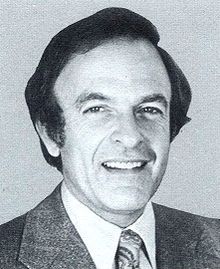Richard Ottinger
| Richard Ottinger | |
|---|---|
 |
|
| Member of the U.S. House of Representatives from New York's 20th district |
|
|
In office January 3, 1983 – January 3, 1985 |
|
| Preceded by | Theodore S. Weiss |
| Succeeded by | Joseph J. DioGuardi |
| Member of the U.S. House of Representatives from New York's 24th district |
|
|
In office January 3, 1975 – January 3, 1983 |
|
| Preceded by | Ogden R. Reid |
| Succeeded by | Gerald B.H. Solomon |
| Member of the U.S. House of Representatives from New York's 25th district |
|
|
In office January 3, 1965 – January 3, 1971 |
|
| Preceded by | Robert R. Barry |
| Succeeded by | Peter A. Peyser |
| Personal details | |
| Born |
January 27, 1929 New York City, New York |
| Political party | Democratic Party |
| Spouse(s) | June Ottinger |
| Children | four |
| Alma mater | Cornell University, Harvard Law School, Georgetown University |
| Profession | Attorney, educator, politician |
Richard Ottinger (born January 27, 1929) is an American politician of the Democratic Party, a former member of the United States House of Representatives, and a legal educator.
Richard Lawrence Ottinger was born in New York City, the son of businessman Lawrence Ottinger, founder of U.S. Plywood, and nephew of Albert Ottinger, the Republican Attorney General of New York from 1925 to 1928.
He attended the public schools of Scarsdale, New York and graduated from the Loomis School, Windsor, Connecticut in 1946. He received a bachelor of arts degree from Cornell University in 1950 and graduated from Harvard Law School in 1953. He also studied international law at Georgetown University.
He served in the United States Air Force from 1955 to 1957, and was discharged as a captain. He was admitted to the New York bar and practiced international and corporate law. He was one of the founders and the second staff member of the Peace Corps, serving as director of programs for the west coast of South America from 1961 to 1964.
In the 1964 election, he was elected as a Democrat to the 89th United States Congress and was re-elected twice. After the 1964 run, Ottinger was criticized for using a loophole in election laws to spend $193,000 of his own money to get around a limit of $8,000 in the race. He set up multiple committees and gave money of all of them. Most prominently, Ottinger's mother, Louise, and sister, Patricia Heath, had set up 22 different committees that in turn donated $6,000 apiece to his campaign.[1]
...
Wikipedia
